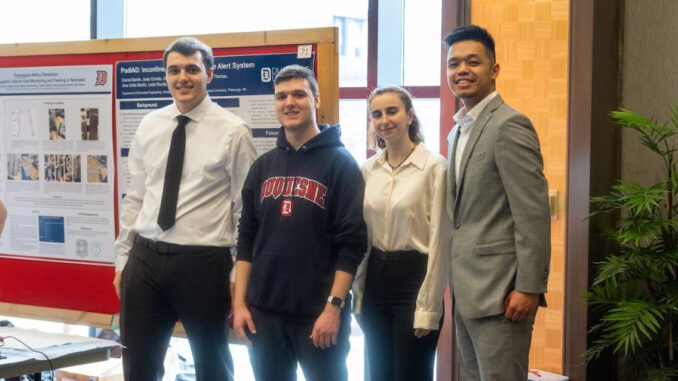
Emily Ambery | Layout Editor
Duquesne held its annual Undergraduate Research & Scholarship Symposium last week showcasing research from across its academic schools. The symposium began on April 15 with a browsing session and will continue through Friday with virtual sessions.
April 17 was dedicated to in-person presentations. Students from six of the academic schools presented projects in morning and afternoon sessions in the Power Center ballroom.
To begin the day of academics, provost David Dausey welcomed participants, judges and family members to enjoy and celebrate a semester of hard work.
Music therapy major Olivia Bigler presented her work which compared Taylor Swift’s Folklore album as a social response to the Covid pandemic to South African songs which were in response to epidemics like smallpox and influenza.
She conducted a lyrical analysis of Taylor Swift’s songs: “Illicit Affairs,” “Epiphany” and “Mad Woman.”
Both orally presenting her work and presenting her poster posed a welcome challenge, she said.
“I think there is something to be said about voluntarily looking to challenge yourself in ways you haven’t before,” Bigler said. “I’m definitely not a natural speaker, so it really just impacted my own abilities to be able to go through this work and then also be pumped up to present it.”
Like many students at the URSS, her background in music therapy brought her to lyrical analysis and cultural reflection.
For junior biology and environmental science major, Alexa Lovelace, it was her coal mining hometown on the other side of Pennsylvania that brought her to her research.
“I was looking around for environmental research here on campus, and I found Dr. Trun’s work, and being from a coal mining town on the other side of the state, I thought it was really interesting,” Lovelace said. “So that’s something I’m familiar with, but not yet scientifically.”
Lovelace presented her poster which examined how Pittsburgh’s history with coal mining would affect water drainage and runoff. Specifically, Lovelace studied bacteria that can reduce manganese levels which, in high levels can cause a variety of health issues.
“Pennsylvania is leading in constructing these remediation systems because we do have so many mines, and it is a problem,” Lovelace said. “It’s improving, but obviously we need to revisit the efficiency of these sites because there’s other factors like the bacteria that are affecting how well these systems are working, but we are definitely on the right track.”
Joel Ward, director of student research engagement, noted that themes vary from year to year but recently climate change and AI generated content have been on the rise.
With 152 projects in total, Ward’s statement reigned true. From junior Anna Gartland’s presentation on the Liberal Arts Major at work to Senior Olivia Kohler’s presentation on adenosine triphosphate on enzymes, guests learned about the breadth of students’ interests.
Some presentations, like senior music major Eric Schaefers, hooked onlookers with captivating graphics. His poster caught attention with “Godzilla” in large red print and the monster graphic in the center of the page.
Schaefer studied the film’s opening theme as representative of the fear Japanese culture had about nuclear bombs following Hiroshima and Nagasaki.
“The distance between two notes evokes fear in the listener. That’s what represents Godzilla throughout the piece; every time we hear that we know, he’s going to be showing up,” Schaefer said. “The dissonant intervals effect that brings to light that fear that Japanese society had regarding the bombs.”
With plans to attend law school after graduating Duquesne, Schaefer thought the symposium would be a good opportunity to get practice in public speaking.
“One of the most important aspects of research is communication,” Ward said in an email. “Being an effective communicator and being able to distill large amounts of technical, complicated information into an understandable and digestible format is critical.”
While the students get experience in presenting, judges also get an opportunity to discover what is going on in their campus community.
Judges are volunteers who are assigned to listen to at least three presentations but are encouraged to judge more.
Shannon Baird, a student success coach in the Pharmacy school said she enjoyed the opportunity to explore what happens all over campus.
With a background in liberal arts, she looked forward to the opportunity to return to her roots by observing research from that field.
“It’s great for people who have a passion for a wide array of subjects,” Baird said. “You can also see what research is conducted on campus, like, what actually happens in Mellon.”
At the end of the symposium, students will receive awards from different departments at Duquesne like the University Sustainability Committee and the Grefenstette Center for Ethics in Science, Technology and Law.
Ward said the winners in each category should be announced in the next two weeks.
Though awards are exciting, for researchers like junior biomedical engineering major Olivia Sullivan, the research and presenting experience is reward enough.
“Research has been amazing; we’re in [the lab] a couple of hours a week just collecting data. We work with Dr. Tanyeri in the biomedical engineering department and he’s super helpful,” Sullivan said. “Presentation wise, things have been going good. People are really interested and asking a lot of questions.”
The week of presenting research to a variety of audiences gives students practice in what their career might look like after college.
“Events like this remind me of why I wanted to work in higher ed in the first place,” Ward said. “It’s incredibly inspiring and rewarding to play even a small role in these wonderful students’ academic journey.”

